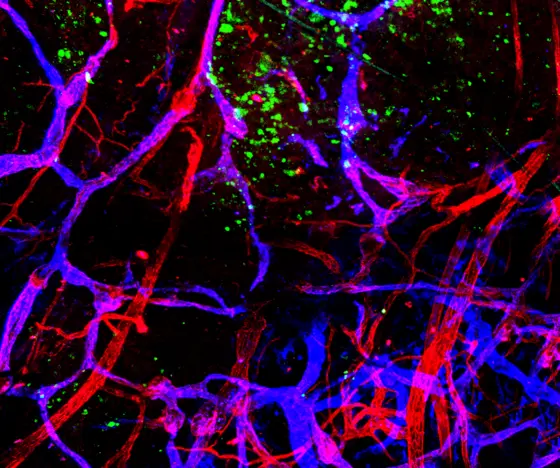Melanomas are one of the tumors that metastasize at a particularly early stage. Metastasis is also the most common cause of death in patients with malignant melanoma, so preventing this devastating outcome is a key goal of tomorrow's cancer treatment. Hellmut Augustin, Moritz Felcht, and their colleagues from DKFZ and the University of Heidelberg's Medical Faculty Mannheim have now discovered the protein angiopoietin-2 (Angpt2) as a possible new target of treatment to prevent metastasis from occurring. The scientists were previously familiar with Angpt2 as a factor that steers the formation of (tumor) vasculature.
Back in 2009, the researchers in Augustin's team identified Angpt2 as a biomarker to predict the progression of melanomas. Angpt2 levels in the blood are increased particularly in those melanoma patients whose tumors have metastasized. Up to now, Angpt2 was seen as a factor that is produced by endothelial cells – in other words, the cells that line the inside of the blood vessels. Although there have been occasional reports that tumor cells also produce Angpt2, there have not previously been any studies that examine how often this occurs and what consequences it has.
In the present study, the scientists investigated the role of Angpt2 produced by tumor cells. Studies conducted on tumor samples from patients showed that the production of Angpt2 in cancer cells is particularly evident in those melanomas that metastasize. Investigations in mice based on this observation demonstrated that Angpt2 in these tumors does not stimulate the formation of new vessels. “If we switch off Angpt2 in the tumor cells in mice, we do not observe any change in the blood vessels; instead, we see that more cancer cells die,“ explained lead author Ashik Ahmed Abdul Pari. “At the same time, we find fewer metastases in these animals.“ The scientists discovered the reason for this in further studies: Without Angpt2, the tumor cells were more sensitive to cell stress and died.
“Our observations were initially made in mice, but it would seem plausible that the situation is comparable in melanoma patients. However, further studies are needed to prove this,“ remarked principal investigator Moritz Felcht. “This means that we might have identified a new target for treatment in the group of patients with a considerably higher level of Angpt2 produced by the tumor cells.“
Abdul Pari AA, Singhal M, Hübers C, Mogler C, Schieb B, Gampp A, Gengenbacher N, Reynolds LE, Terhardt D, Géraud C, Utikal J, Thomas M, Goerdt S, Hodivala-Dilke KM, Augustin HG, Felcht M. Tumor cell-derived angiopoietin-2 promotes metastasis in melanoma. Cancer Res. 2020 Apr 17. pii: canres.2660.2019. doi: 10.1158/0008-5472.CAN-19-2660. [Epub ahead of print]



